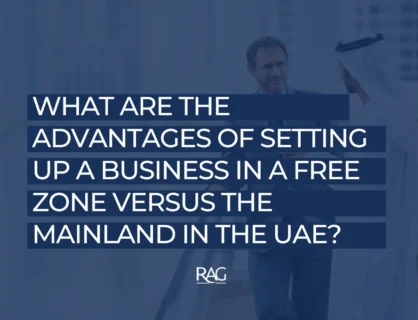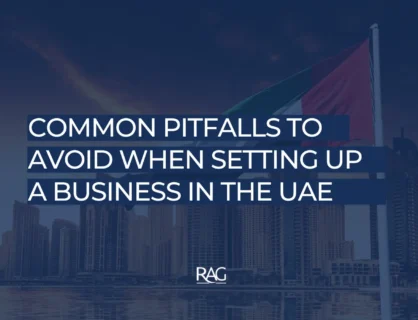What Are the Advantages of Setting Up a Business in a Free Zone Versus the Mainland in the UAE?
If you’re thinking about starting a business in the UAE, you’re in good company. The Emirates have become a global hotspot for entrepreneurs, startups, and established companies looking to tap into a dynamic, fast-growing economy. But before you get swept up in visions of glittering Dubai skylines or the bustling commerce of Abu Dhabi, there’s one big question you need to answer: Should you set up your company in a Free Zone or on the Mainland?
This isn’t just a box-ticking exercise. The choice you make will shape everything from your ownership structure and tax obligations to how and where you can do business. Let’s break down the real advantages of each option, and help you decide which path is right for your venture.
Free Zone vs. Mainland
First, let’s make sure we’re on the same page about what these terms mean.
Mainland companies are registered with the Department of Economic Development (DED) in each emirate. They can operate anywhere in the UAE and internationally, giving you access to the local market, government contracts, and more.
Free Zone companies are set up in special economic areas called Free Zones, each with its own rules and authorities. Free Zones are designed to attract foreign investment and make it easy for international businesses to set up shop. Generally, Free Zone companies can trade within the Free Zone and internationally, but need a local agent or distributor to sell directly to the UAE market.
Now, let’s dive into the advantages of each.
The Big Advantages of Free Zone Setup
1. 100% Foreign Ownership – No Strings Attached
This is the headline feature for many entrepreneurs. In a Free Zone, you can own your company outright, with no requirement for a local partner or sponsor. This means you have full control over your business, your profits, and your decision-making.
Example:
A tech startup from Europe wants to keep its intellectual property and profits in-house. By setting up in Dubai Internet City Free Zone, they retain 100% ownership and don’t have to share control with anyone outside their founding team.
2. Tax Benefits That Boost Your Bottom Line
Free Zones offer some of the best tax incentives in the region:
- No corporate or personal income taxes (for a set period, often 15-50 years, and usually renewable).
- No customs duties on goods imported into the Free Zone.
- Full repatriation of profits and capital, so you can send your earnings home without restrictions.
Why it matters:
If your business is export-oriented or serving clients outside the UAE, these tax breaks can make a huge difference to your profitability.
3. Fast, Streamlined Setup Process
Setting up in a Free Zone is usually much quicker and less bureaucratic than setting up on the Mainland. Free Zone authorities have one-stop shops for registration, licensing, visas, and more. In many cases, you can be up and running within days.
4. Modern Infrastructure and Flexible Office Options
Free Zones are built for business. You get access to:
- High-quality office spaces, warehouses, and logistics hubs.
- Flexible options: virtual offices, co-working spaces, or scalable physical offices.
- State-of-the-art IT and communications infrastructure.
Why it matters:
Startups and SMEs can keep overheads low by starting with a virtual or shared office, then upgrade as the business grows.
5. Industry-Specific Ecosystems and Networking
Many Free Zones are tailored to specific industries: tech, media, healthcare, finance, logistics, and more. This means you’ll be surrounded by companies in your field, with access to industry events, incubators, and collaboration opportunities.
6. Simplified Visa and Immigration Services
Free Zones make it easy to sponsor visas for owners, employees, and even dependents. The process is centralized and often faster than on the Mainland.
7. No Currency Restrictions
You can move money in and out of the UAE freely, with no currency controls or restrictions on capital repatriation.
The Big Advantages of Mainland Setup
Free Zones are great — but they’re not for everyone. Here’s why some businesses choose the Mainland route:
1. Full Access to the UAE Market
Mainland companies can trade directly with customers anywhere in the UAE, including individuals, businesses, and government entities. There are no restrictions on where you can operate, open branches, or whom you can serve.
Example:
A retail chain wants to open stores across Dubai, Abu Dhabi, and Sharjah, and sell directly to walk-in customers. Mainland setup is the obvious choice.
2. Eligibility for Government Contracts and Large Projects
Only Mainland companies can bid for government tenders and public sector projects. This is a massive market in the UAE, especially in sectors like construction, consulting, IT, and engineering.
3. Unlimited Business Activities and Expansion
Mainland licenses cover a wider range of activities (over 2,000 options) and make it easy to add new activities or expand your business as you grow.
Example:
A consulting firm starts with management consulting, then adds HR, IT, and financial consulting services under the same Mainland license as the business grows.
4. Unlimited Visas and Larger Workforce
Mainland companies can apply for as many employee visas as their office space allows. This is ideal for businesses planning to scale up quickly or run large operations.
5. Freedom to Choose Office Location
You’re not limited to a specific area or building. You can rent or buy office space anywhere in the UAE, from city centers to industrial zones.
6. Recent Reforms: 100% Foreign Ownership for Many Activities
Historically, Mainland companies needed a local sponsor (UAE national) to hold 51% of shares. But recent reforms now allow 100% foreign ownership for most business activities, especially in commercial and industrial sectors. Some activities (like oil & gas, defense, and certain “strategic” sectors) still require local involvement.
Which Option Fits Your Business?
Scenario 1: International E-Commerce Startup
You’re launching an online store selling products to customers in Europe, Asia, and the US. You don’t need a physical shop in the UAE, and your team is small.
Best fit:
A Free Zone with e-commerce-friendly policies, virtual office options, and no import/export duties.
Scenario 2: Local Retail Chain
You want to open several retail outlets across Dubai and Abu Dhabi, serving walk-in customers and participating in local events.
Best fit:
Mainland setup, so you can operate anywhere in the UAE and deal directly with the local market.
Scenario 3: Engineering Firm Targeting Government Projects
You provide engineering services and want to bid for large infrastructure projects funded by the UAE government.
Best fit:
Mainland company, as only these can participate in government tenders.
Scenario 4: Tech Startup Seeking Industry Community
You’re a tech entrepreneur who wants to be part of an innovation hub, surrounded by other startups and access to accelerators.
Best fit:
A Free Zone like Dubai Internet City or Abu Dhabi Global Market, where you’ll find a supportive ecosystem.
Common Myths and Misunderstandings
- Myth: Free Zone companies can’t do business in the UAE at all.
Reality: They can, but only through a local agent or by opening a Mainland branch. For most international trade, Free Zones are perfect. - Myth: You always need a local partner for Mainland.
Reality: Not anymore! Many activities now allow 100% foreign ownership. - Myth: Free Zones are only for big companies.
Reality: Free Zones cater to everyone — from freelancers and startups to global giants.
What About Costs?
Costs can vary widely between Free Zones and Mainland setups. Free Zones often have lower startup costs and bundled packages for small businesses, but you may pay more for certain facilities or services. Mainland companies may have higher initial costs (especially for office space), but offer more flexibility for growth and market access.
It’s important to compare not just the setup fees, but also ongoing costs like office rent, visa fees, and licensing renewals.
How to Choose What’s Right for You
There’s no universal answer. Here’s how to approach the decision:
- Define your business goals. Who are your customers? Where do you want to operate? How big do you want to grow?
- Consider your industry. Some Free Zones are tailored for specific sectors, while Mainland is more flexible.
- Think about ownership and control. Both options now allow 100% foreign ownership for most activities, but check the latest regulations.
- Assess your budget and resources. Factor in all costs, not just the headline setup fee.
- Plan for the future. Will you want to expand, add new activities, or open new locations?
If you’re still unsure, talk to business setup experts who know the ins and outs of both options. A little advice upfront can save you a lot of time, money, and stress down the road.
Final Thoughts
Setting up a business in the UAE is an exciting step, and the country offers a wealth of options to suit every kind of entrepreneur. Whether you’re drawn to the flexibility and tax benefits of Free Zones or the broad market access and expansion potential of the Mainland, the UAE has created an environment where businesses can thrive.
For over a decade, we’ve helped entrepreneurs and companies navigate these choices and set up successful businesses across the Emirates. If you’re ready to take the next step, we’re here to guide you — from choosing the right jurisdiction to handling every detail of your business setup. Let’s turn your UAE business dream into reality, together.
Blogs
Warning: Trying to access array offset on false in /home/u330505848/domains/ragroup.ae/public_html/wp-content/themes/rag-uae/single.php on line 77

Why RAG Is Redefining the Co-Working Space in Dubai for Modern Professionals?

How to Create a Bakery Business Plan in the UAE in 2025

Building a Lean Business Plan That Actually Works in UAE

How to Start Your Consulting Business in Dubai?

What Are the Advantages of Setting Up a Business in a Free Zone Versus the Mainland in the UAE?

Common Pitfalls to Avoid When Setting Up a Business in the UAE

How to Identify Your Perfect Niche and Stand Out from the Competition in 2025 in Dubai

 UAE
UAE
 Singapore
Singapore


